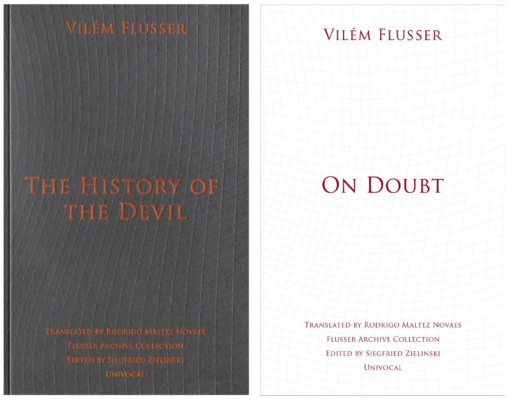
-
NameUnivocal Publishing
-
TitleThe History of the Devil and On Doubt by Vilém Flusser
-
CategoryBook Launch
-
DateOct 9, 2014
-
Time6:30 – 8:30 pm
-
Cost
Free
-
Description
The History of the Devil
by Vilém Flusser
A fascinating exploration into the early work of the celebrated philosopher of media culture and technology.In 1939, a young Vilém Flusser faced the Nazi invasion of his hometown of Prague. He escaped with his wife to Brazil, taking with him only two books: a small Jewish prayer book and Goethe’s Faust. Twenty-six years later, in 1965, Flusser would publish The History of the Devil, and it is the essence of those two books that haunts his own. From that time his life as a philosopher was born. While Flusser would later garner attention in Europe and elsewhere as a thinker of media culture, The History of the Devil is considered by many to be his first significant work, containing nascent forms of the main themes that would come to preoccupy him over the following decades.
In The History of the Devil, Flusser frames the human situation from a pseudo-religious point of view. The phenomenal world, or “reality” in a general sense, is identified as the “Devil,” and that which transcends phenomena, or the philosophers’ and theologians’ “reality,” is identified as “God.” Referencing Wittgenstein’sTractatus Logico-Philosophicus in its structure, Flusser provocatively leads the reader through an existential exploration of nothingness as the bedrock of reality, where “phenomenon” and “transcendence,” “Devil” and “God” become fused and confused. So radically confused, in fact, that Flusser suggests we abandon the quotation marks from the terms “Devil” and “God.” At this moment of abysmal confusion, and of the downfall of all values, we must make the existential decisions that give direction to our lives.
On Doubt
by Vilém Flusser
An attempt to overcome the Cartesian method through an existential analysis of language.In On Doubt Vilém Flusser refines Martin Heidegger’s famous declaration that “language is the dwelling of Being.” for Flusser, “the word is the dwelling of being,” because in fact, in the beginning, there was the word.
On Doubt is a treatise on the human intellect, its relation to language, and the reality-forming discourses that subsequently emerge. For Flusser, the faith that the Modern Age places in Cartesian doubt plays a similar role that the faith in God played in previous eras – a faith that needs to be challenged. Descartes doubts the world through his proposition cogito ergo sum, but leaves doubt itself untouched as indubitable and imperious. His cogito ergo sum may have proved to the Western intellect that thoughts exist, but it did not prove the existence of that which thinks: one can eliminate thinking and yet continue being.
Therefore, should we not doubt doubt itself? Should doubt be allowed to remain indubitable? Should we not attempt to go beyond this last step of Cartesian doubt and look for a new faith? The 20th century has seen many attempts to overcome Cartesian doubt in its search for new faiths, however, this doubt of doubt has instead generated a complete loss of faith, which the West experiences as existential nihilism. Hence, the emergent emptying of values and climate of absurdity that results from such extreme doubt. Everything loses its meaning. Can this climate be overcome? Will the West survive the Modern Age?
Vilém Flusser (1920–1991) was born in Prague, emigrated to Brazil, and later adopted a stateless position in defining himself as a “citizen of the World.” From this groundless frame of reference, Flusser advanced his dialogic philosophy in several languages and is increasingly recognized as one of the most influential thinkers of digital and global culture.
Rodrigo Maltez Novaes is a translator and research fellow at the Vilém Flusser Archive as well as a doctoral candidate at the Universität der Künste in Berlin.
Univocal Publishing is an independent publisher that has been producing books on philosophy, technology, art, and poetry since 2011. They are translating and publishing texts by continental thinkers such as Jean Baudrillard, Gilbert Simondon, Friedrich Nietzsche, Michel Serres, and François Laruelle. These archival quality books with letterpress covers are printed and hand-bound at their Minneapolis atelier, where Univocal is reconstituting an old form of book making infused with contemporary thought and technology.
More information is available at: http://univocalpublishing.com/
-
